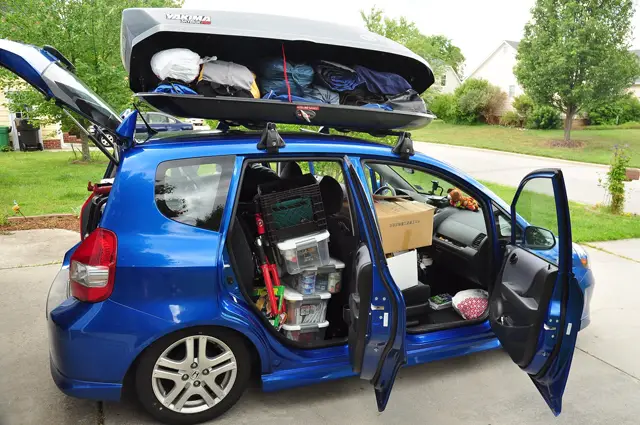Home Away from Home
After moving from North Dakota to New York, I learned a few things about culture shift.
By Abby Wolfe, Colgate University
Whether you’re off to start the school year by car, airplane or train, you’re bound for adventure for the next four years and beyond!
As if college itself isn’t enough to adjust to, you’ve got the added challenge and opportunity to experience life in a new state. Though all fifty states are joined in one great country, it’s amazing how much they differ from each other and how each region can feel like nations apart.

No matter where you’re headed, buckle up for lots of fun and revel in the newness of your circumstance. So you can soak up every moment of the excitement, here are a few things you might want to think about as an out-of-state college freshman.
1. Be prepared to be told that you talk funny.
No matter what state you’re from, somebody from some other state will likely tell you that you talk strangely. At first, it might feel like a cause to blush and hush, but some of the most memorable and hilarious conversations come from duking out who’s pronunciation of “bag” is right (ask a Midwesterner to say this for you and compare it to how a northeastern student says it, and you can talk for hours) or debating whether “cream rinse” or “conditioner” is the better name for your hair care.
Especially when you venture to a state in a different region than where you grew up, the nuances of language become apparent and frequently discussed. Some southern states refer to shopping carts as “buggies,” Midwesterners swap the name “soda” for the characteristic name “pop” and, should you find yourself in the Northeast ordering ice cream and ask for “jimmies,” they’ll know you mean sprinkles. The way people talk highlights a tantalizing array of subtleties that you’ll begin to pick up on as you adapt to your new home state.
It won’t take long to decide which words and phrases you’ll adopt into your speech repertoire from your new state, and which ones feel too weird to change. When you get back home, prepare for the debates to begin again!
2. Coming home won’t feel the same as it may have before.
What used to be normal now might seem out of the ordinary. Home may not have changed, but when you come back, you will have changed, so the process of adapting begins again. After interacting with people who have different ideas, reevaluating your perspectives, forming new relationships and hopefully discovering more about yourself, sometimes trying to fit back into your old world can feel a bit restrictive (like trying to squeeze into your high school jeans after the “freshman fifteen” hits—yikes!).
Taking a walk down memory lane can be comforting, but as you move forward with your life, relationship dynamics with your friends and family back home will need to shift to accommodate your awesome growth.
With friends, prepping them before you leave by letting them know that, while they are not any less important to you, you are going to make new friends at school and will be busy getting adjusted for the first few months (i.e., you don’t want to be glued to your phone constantly or carving out hours to Skype every night) sets up a smoother transition for everyone. It sounds simple, but it can be a really helpful line of communication to open up before you’re up to your eyeballs in new stuff and feeling distant from your hometown buddies. That way, they’ll feel that they have the same freedom as they journey along and start changing too. Hometown friends can be forever if you allow each other the room to grow and respect the ways everyone will change.
3. Some parts of home become so much sweeter.
Mom’s famous spaghetti sauce never tasted so yummy, and your queen size bed is now a luxury compared to the twin XL in your dorm room. Seeing your dog, hearing the familiar family squabbles around the house and frequenting your favorite local places become a process of restoration and reminiscence when you have the opportunity to be home.

One of the greatest things out-of-state students gain by wandering to a new place is an expanded appreciation for all that home is and the things that make it unlike any other place. Though it can be hard to readjust to life at home, especially over longer breaks, the lavish features like home-cooked meals and a comfortably sized shower can help ease the transition into living in your old bedroom (for some this might feel like a treat, while others may feel like redecorating) and with parents, rules and expectations again.
Conversations change as you develop your own take on how the world works and experience things in a way your parents haven’t, and you might even find yourself disagreeing with some of the principles that hadn’t warranted much thought before. In addition, being back home allows you to think critically about that environment as opposed to your new one at school; you may even find yourself wrestling with some qualms about things at home, like long-held homogenous opinions in the family or attitudes of friends that don’t align with your developing ones. If you get back and are feeling stuck or a little out of place, doing your absolute favorite “at-home” things will revive your state pride and love.
4. Getting home can be tricky. Be prepared!
College breaks align with major holidays, when travel traffic and prices are at their peaks. In order to get home and enjoy all of those sweet things about your state, stashing some extra travel cash prior to leaving in the fall is essential, especially if you fly back and forth. Prices on hotel rooms and train and airline tickets spike during the times you’ll probably be returning home (Thanksgiving, winter break, spring break and maybe a couple of long weekends, depending on your academic schedule).
Make travel plans as far in advance as you can to get the best prices and allow extra time for traveling during these high-traffic holidays. If you’re driving, a few extra hours to account for weather and a few fellow road-trippers are a good idea, as well as pocketing loose change for toll fees as you pass through some states—something you may not have had to think about before!
5. Plan out how and what you’ll pack.
It’s a sad moment when you’re packing up the car to take off and two of your bags won’t fit, or when you check your bags and get slapped with a $50 overweight baggage fee. It’s no secret that packing to go to school out of state is not an easy feat, especially when you’re moving for your first semester.

Pay attention to the things you really use and need before you embark, and make sure to leave a little space for local essentials like certain foods you may not be able to get in your school state and a tub of homemade cookies, which you can freeze in your dorm freezer compartment to preserve for when you need a little taste of home. Also, shipping things from Texas to New York and the like can get pricey quickly, so pack what you need to do your Texan thing while you live it up in New York.
The most important things to pack? An open mind, some extra patience and a smile, because your journey is much more than a move from one state to another. The lessons about independence that will come your way and the self-discovery you’ll be afforded by having two places to call home are some of the most valuable rewards you’ll get for venturing from the familiar.
Leaving home is not usually easy, and being bold enough to relocate to a different state and take on the challenge of a different lifestyle is also life changing; the saying “distance makes the heart grow fonder” will garner increasing merit as you journey through your new experience. You’ll have friends from all over America and be able to share a little piece of your home state with them, and bring back tidbits of your new state when you visit home.

















